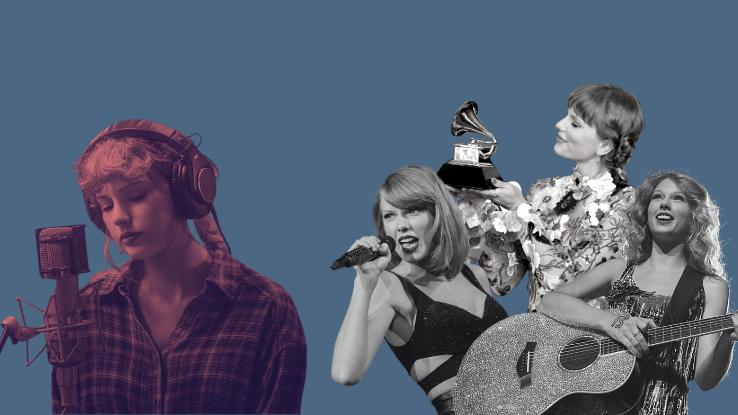Taylor Swift 22 Album Art Sam Hunt Take Time

Dorsum in 2008, then-xviii-year-old Taylor Swift released Fearless, her history-making and Grammy-winning sophomore anthology. Thank you to the album's country-pop hits, like "Love Story" and "Yous Belong With Me," Swift rose to mainstream superstar condition. Not to mention, her beginning six albums, and the corresponding sold-out stadium tours, proved to be incredibly lucrative — not simply for Swift, but also for her then-label, Large Machine Records. In short, the 11-time Grammy winner, now 31, has proven herself to exist both an adept businessperson and an influential artist. Just it's that second moniker — artist — that Swift's critics nevertheless seem to balk at, ofttimes because of her earliest hits.
13 years later its initial debut, Fearless is getting a re-release on April 9, 2021, under the reworked title Fearless (Taylor's Version). In fact, Swift plans to re-record all half-dozen of the albums she released while under contract with Big Car, which, in addition to Fearless, include Taylor Swift, Speak Now, Red, 1989 and reputation. The goal, at to the lowest degree in role, is to own the master recordings of her work.
Recently, the act of regaining control of the narrative has come up quite a flake for the musician. And then much of Swift'southward image was once shaped by her old label and managers: In the Netflix documentary Miss Americana, she recalled the "Don't exist similar The Chicks" warnings she received from seasoned industry professionals. And and then, of course, there was all of that prying media, which presented a narrow (and frequently misogynistic) view of Swift and her love life.
In contempo years, Swift has taken her paradigm and her music into her own hands. Under Republic Records, Swift has released three albums since 2019: the dreamy, synth-pop Lover; the Grammy-winning cottagecore hit folklore; and the "folkloreverse" follow-up evermore. Despite her success, Swift's struggle to regain control of her art has underscored several truths about how we value not just artists, but their fans too.
How Taylor Swift's Dispute With Her Old Label Has Changed the Industry
In June of 2019, Big Machine Records was caused by Scooter Braun, the talent managing director backside popular stars like Justin Bieber. Part of that bargain? Braun became the possessor of the masters to Swift'southward first six studio albums. For those who may non be caught up on music industry speak, a master recording is the original recording — the ane all copies stalk from.

"For years I asked, pleaded for a take chances to own my work. Instead I was given an opportunity to sign back upwards to Big Machine Records and 'earn' 1 anthology back at a fourth dimension, ane for every new 1 I turned in," Swift posted in the wake of the auction. "I learned about Scooter Braun'south buy of my masters every bit information technology was appear to the earth. All I could think about was the incessant, manipulative bullying I've received at his hands for years."
Artists from Prince to the Beatles accept fought for ownership of their masters, but Swift's dispute was hailed by Rolling Stone as one of the 50 "most important moments" in the music industry in the final decade for a very particular reason. The magazine noted that, in "using every tool she's got," Swift "establish[ed] herself as a self-fabricated artist who calls her own shots." Unlike other artists who underwent similar disputes, Swift made it very public, leveraging her platform confronting the exploitation of her art.
In Apr 2020, Big Auto released Live From Clear Channel Stripped (2008), a alive album featuring Fearless-era Swift. Upset, the musician made it known that she didn't authorize the release, stating that information technology was a move full of "shameless greed" — peculiarly amid the COVID-19 pandemic. Previously, Swift had said her musical legacy was in the hands of someone who'd "dismantle information technology" — and that seemed to be coming to fruition. By October 2020, Braun had sold Swift's masters, videos and artworks to Shamrock Holdings for a large pay twenty-four hours.
Equally for Swift? Back in August 2019, earlier the COVID-xix pandemic or the release of Live From Clear Channel Stripped (2008) or the second sale of her masters, she announced her plan to re-record her first half dozen albums. Past November 2020, that procedure was well underway.
Taylor Swift Finds Another Kind of Voice
Long story brusk? Information technology was a bad fourth dimension. And, moreover, the public dispute underscored that even someone with a platform equally massive as Swift'due south is open to manufacture exploitation. "Throughout my whole career, label executives would but say: 'A overnice girl doesn't forcefulness her opinions on anybody. A nice girl smiles and waves and says thank you,'" Swift said in Miss Americana. "I became the person that anybody wanted me to be."

In fact, peradventure the most eye-opening part of Miss Americana is Swift'due south insistence on being on the "right side of history" — of taking everything from her paradigm to her behavior into her own easily. For her whole career, Swift didn't speak out almost politics or other potentially stratifying issues — something she feared doing because of the way many of The Chicks' fans forced Natalie Maines and her bandmates into exile due to their criticisms of former President George West. Bush. "[W]hat happened to [The Chicks] was real outrage," Swift told Diversity. "I registered it — that y'all're always one annotate away from existence done being able to make music."
In 2018, Swift wanted to speak out about so-Senatorial candidate Marsha Blackburn, an anti-LGBTQ+, Republican politician from Tennessee. When reflecting on why she didn't publicly back a presidential candidate in 2016, Swift fabricated it articulate that she felt her "dilapidated public epitome" wouldn't have helped Hillary Clinton's presidential campaign. But, feeling regretful about her silence in 2016, Swift confronted her father and the other members of her squad who'd always influenced her decisions and image. "Dad, I need you lot to forgive me for [saying something]," she says afterward a tense moment in Miss Americana, "considering I'thousand doing it."
Afterward Swift posted virtually how Blackburn both "appall[ed] and terrifi[ed]" her, Vote.org saw a bully of registrations: 65,000 people registered in a unmarried 24-hour period. Like any musician with a massive platform, the power of Swift'due south vocalism is two-fold: not just a means of creative expression, merely a means of rallying support, besides. And, without a doubt, it's that indelible support that has helped Swift turn the tides in the dispute over her masters.
Music Made for Women and Girls Is Often Devalued — and So Are Artists Like Taylor Swift
While Swift has worked to reshape her image and speak her mind, she has also contended with existence put into a box, musically speaking. "Artists should own their own work for so many reasons," Swift posted on her Instagram in March 2021. "But the most screamingly obvious i is that the artist is the merely i who really knows that body of piece of work."

And she's certainly proved that she knows what her fans want. For example, so many of Swift's listeners found themselves bolstered past the surprise release of sociology, an album that, finally, might have solidified Swift's ability to vesture many musical hats. Sure, Fearless had cross-genre appeal, simply it didn't terminate others from writing her off. Despite Red's rock edge, the prevailing narratives in the media oftentimes focused on the songs' subject affair — the people Swift had dated. And while 1989 may accept solidified her status equally a bonafide pop star, Swift was always deemed too something. Too country. Too pop. Also music-for-young-girls.
Harry Styles, Swift's fellow 2021 Grammy winner and a former boy ring member, perhaps put information technology best. When asked if he feels the need to prove himself and his sound to listeners outside of One Direction's scope, the now-solo musician said, "Music is something that'due south always changing. There's no goal posts. Young girls similar the Beatles. You lot gonna tell me they're not serious [music lovers]?" Styles went on to say that teenage-girl fans and young women are honest: If they similar you, they show upwards — and "they don't act 'too cool.'"
And yet, any young adult female or girl who has liked pop music, a bestselling YA romance novel or any other work marketed to them has probably felt some amount of shame. Or endured some kind of "teasing." Equally Styles was quick to point out, "popular" is short for "popular." And yet, fifty-fifty now, artists whose piece of work resonates with young women and girls are nevertheless devalued. Every bit if something tin't be commercial and creative — or as if young women and girls don't have skillful taste or essential stories to share and partake in.
Similarly, putting Swift in a box — belittling her for relationships, for her youthfulness, for her pop prowess — underscores this problem. That is, the way the cultural conversation treats artists like Swift often reflects the way we value others like her and the perspectives she captures in her music. "[Fearless] was the diary of the adventures and explorations of a teenage girl who was learning tiny lessons with every new cleft in the facade of the fairytale ending she'd been shown in the movies," Swift tweeted. And, without a dubiety, those are stories that deserve to be told and, moreover, heard by those who've lived their ain versions of them.
Head First, Fearless (Taylor's Version)
"When I recall back on the Fearless album and all that you turned information technology into, a completely involuntary smile creeps across my face. This was the musical era in which so many inside jokes were created between us, so many hugs exchanged and hands touched, so many unbreakable bonds formed," Swift wrote in a contempo post, speaking directly to her longtime fans. "So before I say anything else, let me just say that it was a real honor to get to be a teenager alongside you."

The starting time single off the Fearless re-release was Taylor's Version of "Love Story," which doesn't audio likewise drastically different from the original. In that location are some new pauses and different twangs — the kind of rich and precise production found in sociology. But the about exciting departure? The assuredness in Swift's voice.
This is a confident, in-control creative person who's looking back and retelling a story she once sang in a more than heat-of-the-moment fashion. Sure, we may know the lyrics all too well, but, this time, at that place's a knowing fondness in Taylor's phonation for a time that once was — for what's being re-recorded and re-remembered.
Source: https://www.ask.com/culture/taylor-swift-fearless-why-dismissing-popular-art-is-harmful?utm_content=params%3Ao%3D740004%26ad%3DdirN%26qo%3DserpIndex
0 Response to "Taylor Swift 22 Album Art Sam Hunt Take Time"
Post a Comment